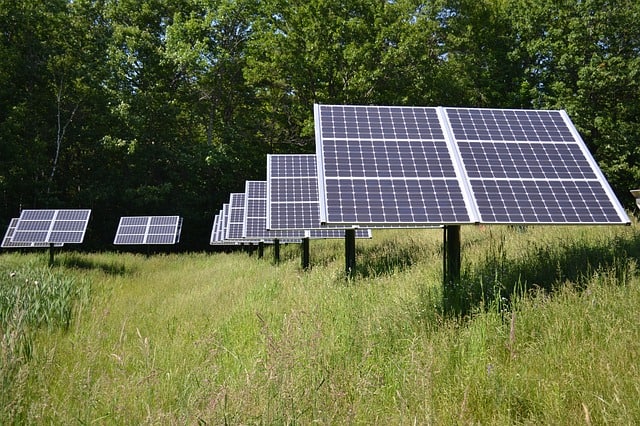Solar energy is one of the various forms of renewable energy in the world. It’s also among the many various types of energy which are in the high capacity of great benefits and support to its users.
What Is Solar Energy?
The definition of solar energy would be stated as the sun’s radiation which has the capability of electricity generation, heat production and the ability to cause chemical reactions.
Solar energy would also be defined as the energy that is tapped from the radiations of the sun and put to use on earth’s surface in different ways. Solar energy is always at a continuous run to the earth’s surface.
Some of the many uses where solar energy is used are the utilization of it in maintaining the temperatures of a house to make it comfortable for habitation without the use of any machinery.
Among the many other uses of solar energy include: used in the generation of electricity through tapping it using solar panels which convert it to electric power, used in distillation process which involves separation of salt and water, used by plants in the food making process called photosynthesis and also used in the heating of water.
Like any other energy or form of energy, solar energy has its various pros and cons. The advantages and disadvantages of solar energy areas discussed in the subtopics below:
Advantages Of Solar Energy
An advantage of something would be defined as the factors that propel the achievement of its defined goals. The advantages of solar energy are the factors that propel solar energy been put to the maximum and effective utilization and making it user-friendly in all aspects. There are various advantages associated with solar energy. Among the various advantages include the following.
- Infinite Form Of Energy: Solar energy is an infinite source of energy compared to other sources of energy. For instance, solar energy is available all over the world and can be utilized in any part of the world during the day. This is a great advantage since there is no possibility of any day lacking sunlight from the sun. Sun radiation will always be produced and it’s continuous for an approximation time of five billion years.
- A Substitute For Grid Electricity: since solar energy produces electricity, the electricity produced by one’s solar system is used to supplement the electricity from the national grid. When there is adequate electricity produced by the solar system, that means that the electricity from the national grid will not much be used consequently reducing the expenses of paying for the grid electricity. However, if one’s solar system produces a lot of electricity, the excess solar electricity can be transferred to the grid if only the solar system is connected to the grid. The owner of the solar system with the excess production of energy is then paid for giving the excess electricity to the grid. So, solar energy can also increase sources of income to the owner of the system.
- Economical Conservation Cost: Generally, a solar system requires very minimal attention to maintenance. This is attributed to the fact that solar panels only require cleaning and dust removing and that one is adequate conservation of the system. However, for a mechanized or specialized cleaning, if anyone prefers the same, they are relatively affordable and run for a long period of time until their subsequent professional cleaning services. Moreover, solar panel and solar system companies also over a long period of time as warranty time, for instance, most companies offer a warranty period of about twenty to twenty-five years. Another factor for cheap maintenance costs of solar panels is the fact that’s there are no moving parts in a solar panel which may be the major cause of tear and wear. Major replaceable parts in a solar panel, for instance, the inverter take a long period of time to replace for instance five years.
- Multiple Various Uses: there is a wide range of applications of solar energy. Solar energy is used in different purposed for instance, it’s a major source of electricity production in remote areas which have not been connected to the national grid, it’s also used in the provision of power to the space satellites and can also be used to provide a process of water distillation in regions where there is no adequate water provision. Building materials can also be incorporated with energy from the solar for adequate comfort of a house for habitation, an activity that was recently put into practice by Sharp by the invention of windows that are transparent to solar energy.
- Enhances The Development Of Technology: In the case of the continuous use of solar energy, there develops the urge and curiosity to develop more in the sector since it’s continuous energy used and currently in high use and demand all over the globe. The technology development is due to the goal of improving the use and harvesting of the solar energy sector. There are various sectors or entities of the solar energy that are in constant development for instance: the basic theory involved in physics which outlines the appearance of things on earth’s surface at the least of its atoms and combining elements. Another entity of technological advancement in solar energy is the scientific belief of putting the matter into control by the least of its scientific molecules.
- Its Availability Is Free – solar energy is accessible by all human races on the globe without any cost of payments for it. Nevertheless, there is a variety of machinery that may be needed to enhance the production of electricity from the sun’s radiation. This is its second stage of acquiring electricity from solar, whereas the radiations of the sun are freely available at definitely no cost.
- A Source of Income: if anyone decides to have a solar power production firm, it can produce a lot of power where the power produced from the firm can be sold to the national grid and income is generated to the firm. Selling surplus power is a great source of income for the owner of the firm.
- Increase In The Value of a Property: the accessibility or installation of a solar power system in a home increases the selling value of a home if the owner decides to sell it. The value of the property increases because of the availability of the solar system in the home. So, in the calculation of the valuation of the property, the value of the solar system is always considered.
- Increases The Aesthetic Value of Property– Beliefs has it that the visual outlook of a property would be made better by the installation of a solar system. The solar system makes the rooftop of a building look more appealing than a rooftop without a solar system.
- Creation of Employment Opportunities: Jobs are majorly created in the sector of solar energy through various means. Some of the various means in which employment creation is done include the manufactures of the solar machinery, installation of the solar system and also in the transportation of the solar machinery to the point of installation.
Disadvantages Of Solar Energy
A disadvantage would be described as a situation that leads to drawing back the prospected achievable goal of something. Disadvantages of solar energy are the factors about solar energy which hinder or reduces the effectiveness of its use. Like any other form or source of energy, there are the cons associated with every form of energy. Discussed below are some of the different disadvantages of solar energy. They include:
- Expensive Harvesting: For solar energy to be used at night, it’s necessary that there are large batteries where it can be stored to be used at night which makes it expensive since there is also an involvement of the maintenance cost of the batteries. This is because the most efficient way of using solar energy is direct use. However, solar energy can maximum be put into use during the day and any night the stored energy in the batteries put into use. Again, since there is a lot of power demand during the day, solar energy can be used during the day and then source electricity from the grid when night falls. This is highly applicable in the case where the solar system is linked to the grid which is also very expensive.
- It Depends On Weather: Although solar energy can be tapped continuously as a renewable source of energy, it depends also on the weather. The intensity of the solar energy collected is highest on a sunny and clear day where radiations of the sun are and maximum and the solar panels harvest it to the maximum. In the case of a cloudy or rainy day, the intensity of solar radiation reduces and the efficiency of the solar panels consequently reduces although there is still a collection of solar energy but at a very low rate. Most importantly, collection of solar energy can only be done when there are sun radiations but in the case when there is no sun radiation the collection is significantly minimal.
- High Space Requirement: Space requirement is directly proportional to the amount of power it would like to produce. Solar panels require a lot of space and space should be directly accessed by the sun’s radiations. Most are times when the rooftops of buildings fail to provide adequate space for the installation of solar panels. In such cases, one is forced to install solar panels off the rooftop and install them at the rear side of the compound which is the yard. In the case where the yard is not enough, one is forced to hire a piece of land and install the solar panels on that land if they are interested in bulk production of solar energy. The rooftop would only be adequate for the basic minimum requirements of power in a homestead. In the cases where one is interested in setting up a plant for the production of solar energy, huge pieces of tacks of land are a requirement for setting up the maximum panel machinery for the maximization of the tapping of the sun’s rays.
- Pollutant: Although the pollution that comes from solar energy is not as intensified as the pollution that is produced by various forms of energy, solar energy is slightly associated with minimal pollution. Most of the pollution which is associated with solar energy comes from the activities around the production of solar energy but not solar energy directly. For instance, the production of solar energy panes from companies is associated with the production of environmental unfriendly gases and various environmental unfriendly materials. The ferrying of the solar system from one point to the other is also involved with the production of environmental unfriendly gases. However, the intensity of pollution produced by solar energy is highly below the intensity of pollution from other various forms of energy.
- Costly: Initially, the acquisition of a solar system would be considered expensive through the fact that there are various instruments to be put into place for it to be harvested. Acquiring the complete system would be termed as expensive due to the various activities involved in getting the whole system which may include: making payments for the various entities in the system which include the panels, power batteries, the wires, and the inverter. The manpower which also includes the installation of the system needs to be paid. However, the technology that is involves around and within solar is in a continuous state of development giving hope to every solar energy interested person that the cost will subsidize at a time to come.
- Relatively Low Efficiency: Scientific studies have it that only a particular percentage (15-20) of the total amount of sun’s radiation falling on the solar panels turned into solar energy. This indicates that 80% of the sun’s radiation is not made into solar power. Another indicator of low efficiency is the level of the solar panels been fragile. Solar panels are very fragile and are prone to breaking in the case of falling on a hard surface.
- Natural bias- This is always indicated and well defined in the aspect that some countries receive more solar radiation than other countries. The countries which are more adjacent to the equator receive more sun’s radiation compared to the countries away from the equator.
Conclusion:
The existence of solar radiation and solar energy is of great advantage to the world and the consumers of solar energy. This is attributed to the many advantages and disadvantages of solar energy.
The few numbers of disadvantages associated with solar energy can be turned around into advantages or eliminated by the proper investment of the various government agencies, stakeholders, interested parties and the community in the related solar technological advancement with the propelling power of the government.
The advancement of the technology dealing with solar energy would solve challenges involved in it like, large space requirement for the installation of solar panels, ensuring that the production of the related machinery for the production of solar energy is not leading to the release of harmful gases to the atmosphere and the environment which consequently leads to environmental degradation and the world’s major problem of greenhouse effect.
Solar energy is a great source of energy to the world and major investment in it would be of a great boost to the grid.





It’s interesting to learn that solar energy is an infinite source of energy compared to others. My wife and I are wanting to repair our house and we were wondering how we can save on our energy bills. I’ll be sure to talk to my wife about possibly utilizing solar energy in our house.